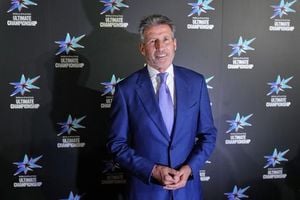Robert F. Kennedy Jr. has made headlines recently after being nominated by President-elect Donald Trump to lead the Department of Health and Human Services (HHS). This decision is as controversial as it is significant, especially considering Kennedy's well-documented history as a prominent figure against vaccination, which many view as misinformation. Over the years, he has garnered attention for advocating ideas and theories typically rejected by the scientific community, making his potential confirmation as HHS Secretary highly contentious.
The 70-year-old Kennedy, son of former Attorney General Robert F. Kennedy and nephew of President John F. Kennedy, has transitioned from being recognized primarily as an environmental lawyer to being one of the most vocal proponents of vaccine skepticism. His role in the anti-vaccine movement escalated during the COVID-19 pandemic, spotlighting his claims against notable public health figures, including Dr. Anthony Fauci. Kennedy’s assertions, particularly his accusations of the pandemic being exaggerated to compel vaccination, have stirred significant controversy.
When Kennedy started his political career with aspirations for the Democratic presidential nomination, he claimed his interest was ignited by the need for transparency and valid science behind vaccine safety. Yet, his pronouncements, alongside his backing from Trump, challenge the established norms of public health governance and present alarming prospects for American medical policy. Last October, he switched from running as a Democrat to becoming an independent candidate, later endorsing Trump.
Trump's announcement of Kennedy's nomination for HHS came with grand promises such as `restoring traditions of Gold Standard Scientific Research` and addressing the `overwhelming health crisis` facing Americans. Many critics view these claims as steeped more in political theatrics than scientific grounding. Since joining Trump, Kennedy has spearheaded the “Make America Healthy Again” campaign, which ostensibly aims to reduce chronic diseases, but lacks scientific backing for many of its core assertions.
His public comments consistently allude to what he describes as the “FDA’s war on public health,” spotlighting unsubstantiated therapies and products, including raw milk and drugs like ivermectin and hydroxychloroquine touted for COVID-19 treatment. Despite repeated findings from clinical trials indicating these drugs do not have the efficacy he claims for COVID-19, Kennedy remains steadfastly vocal.
During his recent campaign communications, Kennedy promised sweeping changes, stating, “If you work for the FDA and are part of this corrupt system, I have two messages for you: 1. Preserve your records, and 2. Pack your bags.” His stance not only positions him against agencies he will oversee but creates tension about his commitment to public health.
Kennedy's influence as the head of HHS raises substantial concerns for the oversight of major health institutions. The HHS oversees numerous agencies, including the Centers for Disease Control and Prevention (CDC), the Food and Drug Administration (FDA), and the National Institutes of Health (NIH). These agencies play pivotal roles in public health policy and vaccine regulations.
Given Kennedy's ambitions, public health experts worry about the significant impact he could have on these institutions, especially concerning vaccine safety regulations. He has also intimated intentions to eliminate FDA departments and suggested he would make substantial personnel changes within the NIH, which could directly alter the public health infrastructure.
Complicators within Kennedy's potential confirmation include his polarized views on vaccination safety, where he advocates for vaccine studies to be widely available to the public and presents himself as pro-vaccine safety. Yet, many see his assertions and historical comments as fundamentally anti-vaccine. His claims about vaccines being linked to autism have long been debunked by scientific research, yet Kennedy continues promoting them.
To visualize the uncertainty surrounding his nomination, Canadian officials took action to end fluoridation of drinking water, influenced by petitions and public campaigning inspired by Kennedy's public health views. Kennedy argues fluoride leads to various health problems, claiming it to be harmful, even as health authorities like the CDC endorse its public health benefits for dental health. Such actions exemplify the real-world consequences of his rhetoric.
Kennedy's views extend beyond vaccines, permeate discussions surrounding food regulations and agricultural practices. His advocacy against government regulations on health products, particularly targeting the FDA, resonates with some constituents but alarms public health officials concerned about safety measures potentially being dismantled.
Among the Republican Senate members, opinions on Kennedy's confirmation are mixed. He can afford to lose four Republican votes to secure his confirmation if all Democrats oppose him. Several Republican senators have expressed reservations about his views on vaccination and abortion, with some endorsing calls for more transparency and insights from him prior to any confirmation. Others have downplayed concern, leaning toward support.
His views on abortion add another layer to his controversial persona; Kennedy has stated he supports legal access to the procedure but also implied intentions for potential restrictions. His fluctuatings stance and promises during the campaign include strong communications toward consulting with diverse opinions before implementing any bans, indicating he may not align neatly along party lines.
This finely woven web of potential changes paints a complex picture of Kennedy’s impact, encompassing not just personal health policy but laying potential shifts on food, environmental safety, and vaccine development. Current public health officials are bracing for these changes as they attempt to understand what Kennedy’s leadership would truly signify.
While some see Kennedy as bringing pivotal change to the HHS, others stress the potential dangers of placing someone with his history at the helm of American health policy. Concerns are arising over possible reversals of scientific progress made within public health and the repercussions this could have on communities across the nation.
Entangled within this political narrative are enormous health risks. The prospect of Kennedy's policies and beliefs reshaping HHS necessitates vigilance among public health experts who fear misinformation could sway decision-making processes. The nomination's fallout will likely reverberate through policy and practice long after any confirmation vote.
With the Senate still weighing Kennedy’s nomination and public opinion sharply divided on the matter, the path forward remains foggy. Critics of his nomination are urging thorough scrutiny as Kennedy stands at the crossroads of health policy and misinformation.



